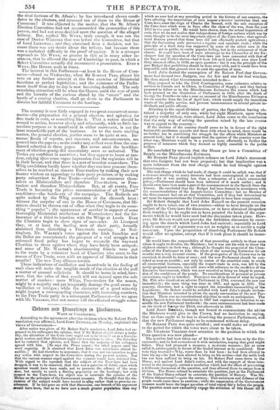The country is now fairly engaged in two great concurrent
move- ments—the preparation for a general election, and agitation for free trade in corn, or something like it. That a nation should be roused to action, however slowly and reluctantly, with so little im- mediate purpose as is manifested in either movement, is not the least remarkable part of the business. As to the more exciting matter, the general election, parties seem to be quite at sea. Im- mense floods of reports, and rumours, and announcements, are poured into the papers ; as the reader may collect even from the con- densed selection in these pages. But never amid the bewilder- ment of election-gossip did uncertainty seem so universal. The Tories are confident in assertion ; but they appear to boast at ran- dom, relying Upon some vague impression that the registries will be in their favour, and that there is a sort of reaction somewhere. The Whig candidates hardly know whether they can best procure them- selves to be received as sincere Free-traders by making their new finance wisdom an appendage to their party promises, or by making party subservient to Free Trade—whether to announce them- selves as Ministerialists and therefore Free-traders, or Free-
traders and therefore Ministerialists. But, at all events, Free Trade is becoming the prime recommendation of all "Liberal" candidates—the battle-cry of the campaign. The Radicals are quite melted by the Whig conversion at the eleventh hour : witness the surprise of one in the House of Commons, that Mi- nisters should be thrown out of office when they begin to do some- thing " popular " ; the appearance of another in support of some thoroughly Ministerial resolutions at Westminster; • and the for- bearance of a third to interfere with the Whigs at Leeds. Even the Chartists begin to show signs of surrender. At Liverpool they, or at least the leading men of their party, formally abstained from disturbing a Free-trade meeting. At Not- tingham, Mr. Wevrea's votes against the Irish franchise and the Ballot are remembered ; the prospect of a real struggle for a reformed fiscal policy has begun to reconcile the wayward Chartists to those against whom they have lately been arrayed ; and some of Mr. WALTER'S electioneering friends were put to the route by a volunteer band of Chartists who came to the rescue of Free Trade, even with an approval of Ministers in their mouths ! The new Tory alliance totters. These indications of oscillation and incertitude in the feeling of each class will make the tangible result of the election at the poll a matter of unusual solicitude. It should be borne in mind, how- ever, that the value of that result will not depend upon the sole matter of numbers : mere Whigs, Free-traders for the nonce, might be a majority and yet irreparably damage the good cause by vacillation or intrigue; while the character of a good minority might impart a corresponding character, with increasing numbers, to the Free Trade party in a subsequent Parliament—for we agree with Mr. VILLIERS, that not sooner will the effectual struggle come.


























 Previous page
Previous page